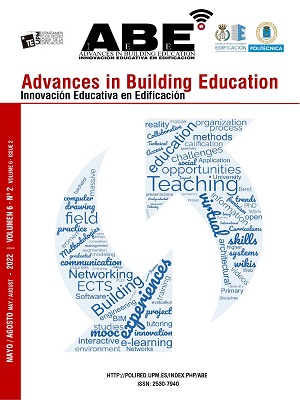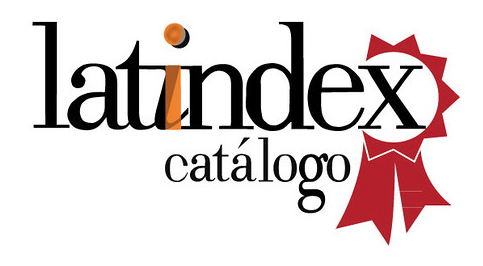What do we know about sustainable construction? The importance to learn from the global knowledge. The Venezuelan case
DOI:
https://doi.org/10.20868/abe.2022.2.4944Palabras clave:
Sustainability, Construction, Covid-19, Venezuela, Education InnovationResumen
Construction stakeholders plan to guarantee the success of projects. Still, the results frequently are different in quality, time, or costs. The disruptions are frequent, and the stakeholders must be ready to react promptly to changes while keeping competitiveness and sustainability. This goal requires proper construction education. Based on diverse civil engineering and architecture programs, the article evaluates if current construction education includes past knowledge, notions of sustainability, and global matters to allow its participants to identify challenges and risks, giving them the tools to act appropriately. The results show different construction education perspectives. Some are very advanced, and others are not. The Venezuelan case is a reference to link theory and practice in the construction sector. Incorporating critical analysis and comparisons with data and cases from diverse successes, disruptions, or errors is presented as education innovation to support this industry's competitiveness and sustainability.Descargas
Referencias
United Nations. Quality Education. 4th Development Goal https://www.un.org/sustainabledevelopment/education/
European Student Union Statement on Sustainability 3 Nov 2019 Board meeting 77 7b2 Document number: BM77/ Point 7b2 Revision: 001 Authors: Executive Committee Date 03/11/2019 https://www.esu-online.org/?policy=bm77-statement-on-sustainabilityJanuary 23, 2020.
American Society for Engineering Education ASEE Statement on Sustainable Development Education. https://www.asee.org/about-us/the-organization/our-board-of-directors/asee-board-of-directors-statements/sustainable-development-education, 1999.
Y. Wang. Sustainability in construction education. Journal of professional issues in Engineering education and practice. ASCE 135 (1): 21-30. January 2009. https://doi.org/10.1061/(ASCE)1052-3928(2009)135:1(21)
Green Building Education: A complete guide. https://www.gbrionline.org/green-building-education/
C. De Gaulmyn, K. Dupre. Teaching sustainable design in architecture education: Critical review of Easy Approach for Sustainable and Environmental Design (EASED) 2019 Australia. Frontiers of architectural research. Mar 2019 https:// doi.org/10.1016/j.foar.03.001. https://doi.org/10.1016/j.foar.2019.03.001
De architectura. Marco Lucio Vitruvio Pollione.
History Of Cities And City Planning By Cliff Ellis.
Role Modeling Sustainable Living through the Ancient City of Caral-Supe , 2015.
Bhowmick Dhira and Dkhar V.C.S. Ancient Architecture: Impressive, Imperishable and Inimitable Asian Journal of Multidisciplinary Studies ISSN: 2321-8819 (Online) Volume 2, Issue 5, May 2014 2348-7186 Available online at www.ajms.co.in 47
RTVE Archeomania. Video: HERCULANO Prácticas de construcción sostenible.
A lesson in sustainability from ancient cities https://bee-inc.es/2015/11/17/ancient-cities-sustainability
L. Pietrosemoli, C. Rodríguez-Monroy. Characterization of the infrastructure and public services in Venezuela. Diagnosis and proposals. 5º Congreso Internacional de Innovación Tecnológica en Edificación. CITE 2020. Madrid, 2020.
Banco Interamericano de Desarrollo (BID). Una mirada a futuro para Venezuela. Aug 2020.
Portillo 2019. Foro Crisis eléctrica en Venezuela. Donde estamos, hacia donde vamos. CIV.
Portillo 2016. Servicios en crisis. Sin luz y sin transporte. CCM
www.corpoelec.gob.ve/proyectos
Salas. 2018 indagación sobre el sector eléctrico en Venezuela.
World Bank, World Bank Indicators. Venezuela. https://tcdata360.worldbank.org/indicators/he81eeee0?country=VEN&indicator=536&countries=COL&viz=line_chart&years=2007,2017&indicators=944. Accessed Jan 19, 2021.
International Labour Organization. IOL. Developing the construction industry for employment-intensive infrastructure. 2019.
Descargas
Publicado
Número
Sección
Licencia
ABE (Advances in Building Education / Innovación Educativa en la Edificación) no aplica cargo alguno a los autores por procesar o publicar un artículo y provee acceso abierto (Open Access) inmediato a su contenido. Todo el contenido está disponible gratuitamente sin cargo para el usuario o su institución. Se permite a los usuarios leer, descargar, copiar, distribuir, imprimir, buscar o vincular a los textos completos de los artículos, o utilizarlos para cualquier otro propósito lícito, sin pedir permiso previo del editor o el autor. Esto está de acuerdo con la definición de acceso abierto de la BOAI.
1. Los autores conservan los derechos de autor y garantizan a la revista el derecho de una Licencia Creative Commons Atribución / No Comercial / No Derivadas 4.0 Internacional (CC BY NC ND) que permite a otros compartir el trabajo con un reconocimiento de la autoría y uso no comercial.
2. Los autores pueden establecer por separado acuerdos adicionales para la distribución no exclusiva de la versión de la obra publicada en la revista (por ejemplo, situarlo en un repositorio institucional o publicarlo en un libro).
Salvo indicación contraria, todos los contenidos de la edición electrónica se distribuyen bajo una licencia de uso y distribución “Creative Commons".














